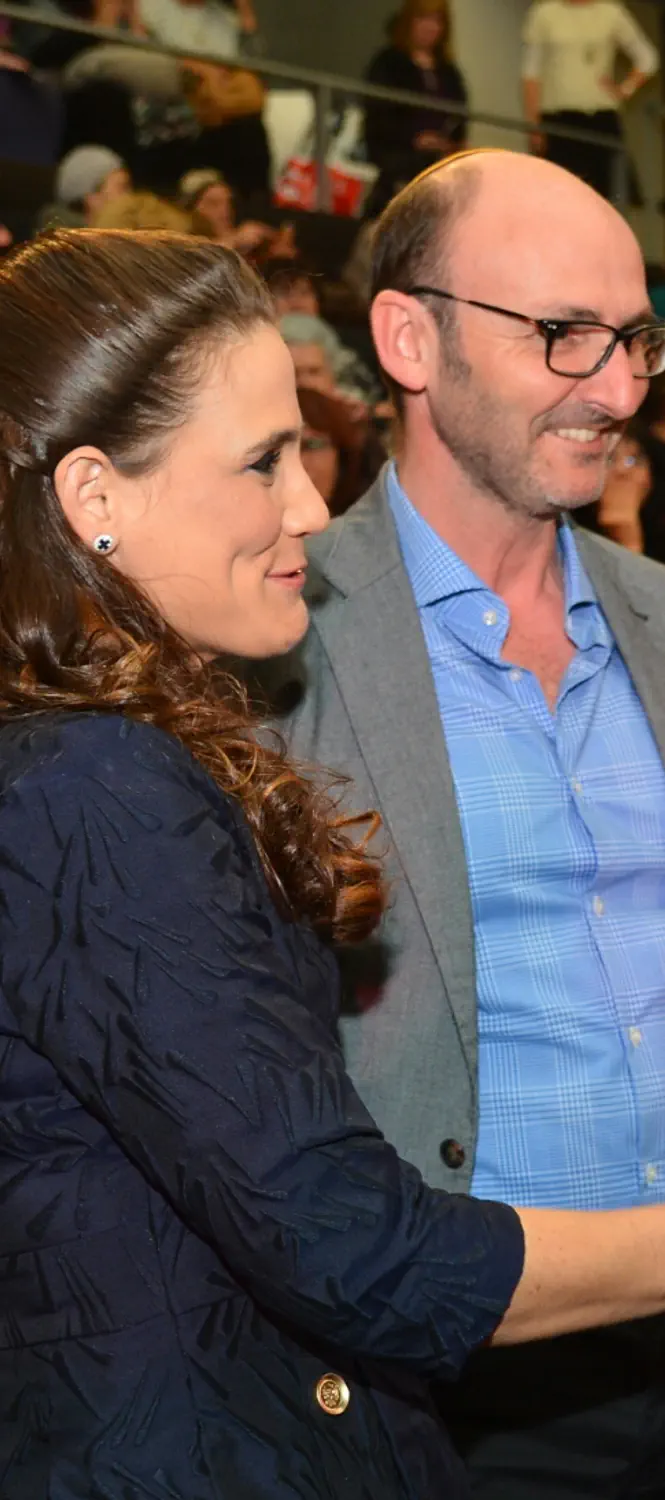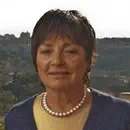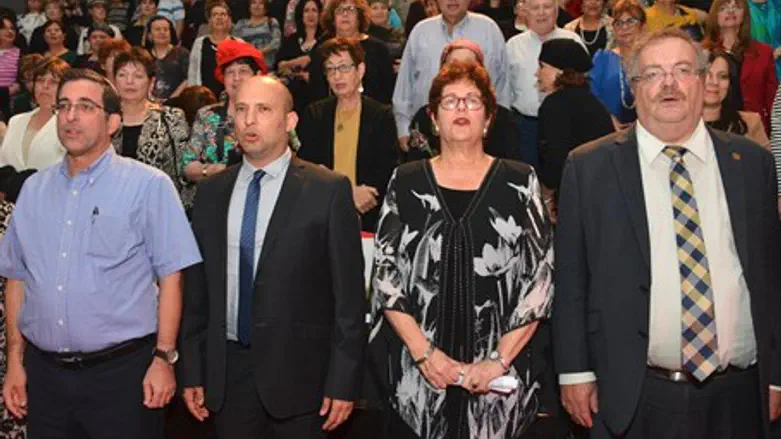
Emunah, the National Religious Women's Organization, is a fantastic enterprise. This week, the organization held an evening to celebrate the eighty years since its founding, decades in which its leaders, workers and dedicated volunteers established 140 day care centers for working women, 5 children's homes that provide nurture and warmth for at-risk youngsters including one for children with psychological problems, a Children's Crisis Center, Women's College of Arts and Technology, 13 family counseling centers, Midreshet Emunah for the Study of the Jewish Woman and Family, myriad projects for immigrant absorption - and even a Professional and Businesswomen's Club, all the while accomplishing much to advance the status of the family and of women in the State of Israel.
In all this, it is aided by the 29 branches of World Emunah - headed by Dina Hahn and Naomi Liebler - the largest of whose groups are in the USA and UK, but also in countries ranging from Switzerland to Australia, Canada and South America.
Jewish Home party chairman and Education Minister Naftali Bennett, who addressed the festive crowd of Emunah women and friends that filled the auditorium at the Bar Ilan University Wohl Center, said it best when he described Emunah as "combining the professionalism of a hi-tech firm, the single-mindedness of a commando unit and the dedication of a mother."
It is no wonder that, along with Naamat and Wizo, Emunah was awarded the coveted Israel Prize in 2008 for its contributions to the Jewish State and that among the celebration attendees one could spot many well known Religious Zionist figures, such as Deputy Defense Minister Rabbi Eli Ben Dahan, MK Moti Yogev and MK Nisan Slomiansky.
The evening's program reflected the organization's many achievements. Former Minister and Bar Ilan President Rabbi Prof. Danny Hershkowitz, whose wife also attended, praised the organization and joined in presenting awards to nine volunteers, including three men and even two bat mitzvah age girls, honored for special achievements under Emunah auspices, for activities ranging from leading a women's choir to acting as a parent to at-risk children.
Religious media personality, Sivan Rahav Meir, acting as emcee for part of the evening in addition to Emunah coordinator Gila Schwartz, interviewed 92-year-old iconic Ada Krell of Emunah Petach Tikva - who still goes out every day to check on the low-cost golden age restaurant she founded - and Emunah Chairperson since 2001, Leora Minka, whose words epitomized Emunah's vision for the present and future.
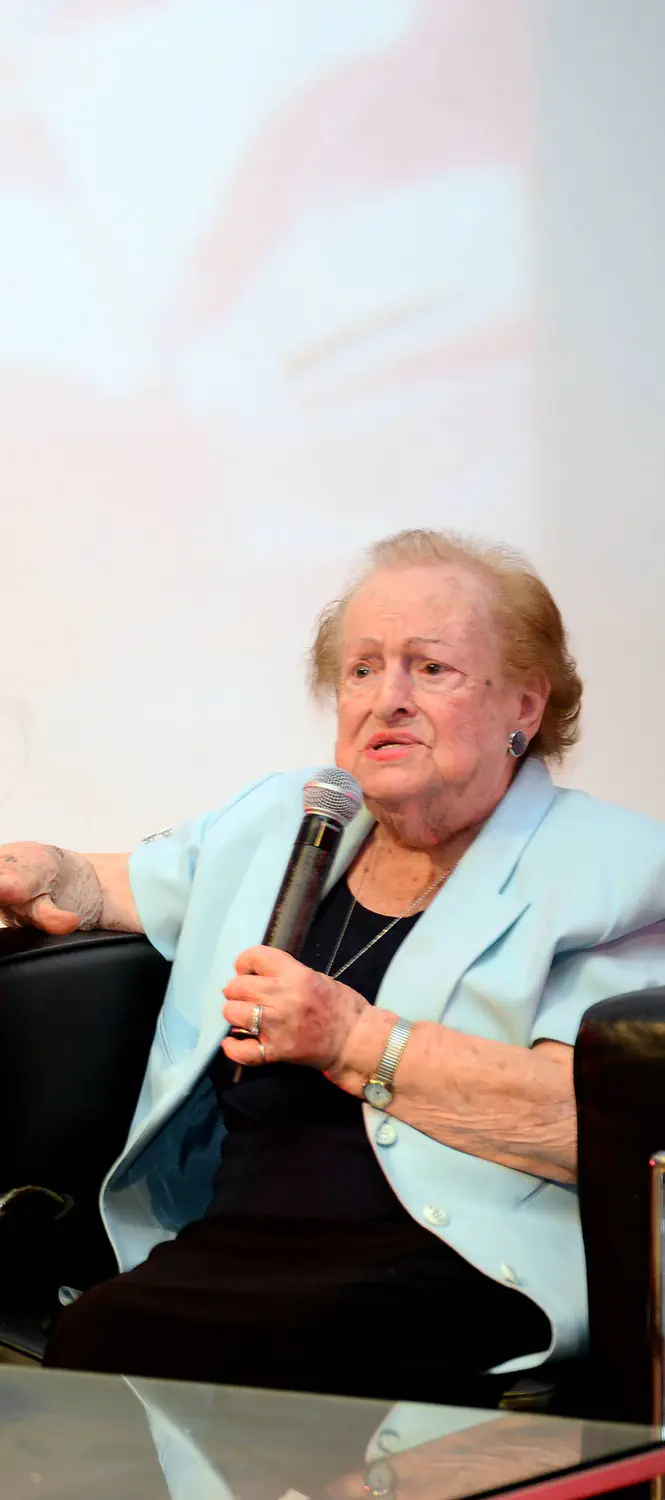
The children's choir of the Neve Michael Emunah home sang with self confidence and enthusiasm, belying the difficult lives the youngsters led before being brought into the warm atmosphere of Emunah. And the sky became the limit when Rahav Meir interviewed 20 year old Asya Kablan, who came to an Emunah home at the age of twelve, "not knowing," she said, "that children are supposed to have adults who care for them, help and even discipline them." Asya, charming and personable, successfully completed army service and is now at Bar Ilan. She told the audience that she recently became a baalat tshuva, saying:"This happened because I was not pressured in Emunah's Netanya children's home, but exposed to the beauty of Judaism." She sat on stage next to Tzili Shafir, a young counselor at the home who is in charge of keeping in contact with graduates and lending a helping hand. "I called her two days ago to cry about something," Asya said, "I know she is always there for me."
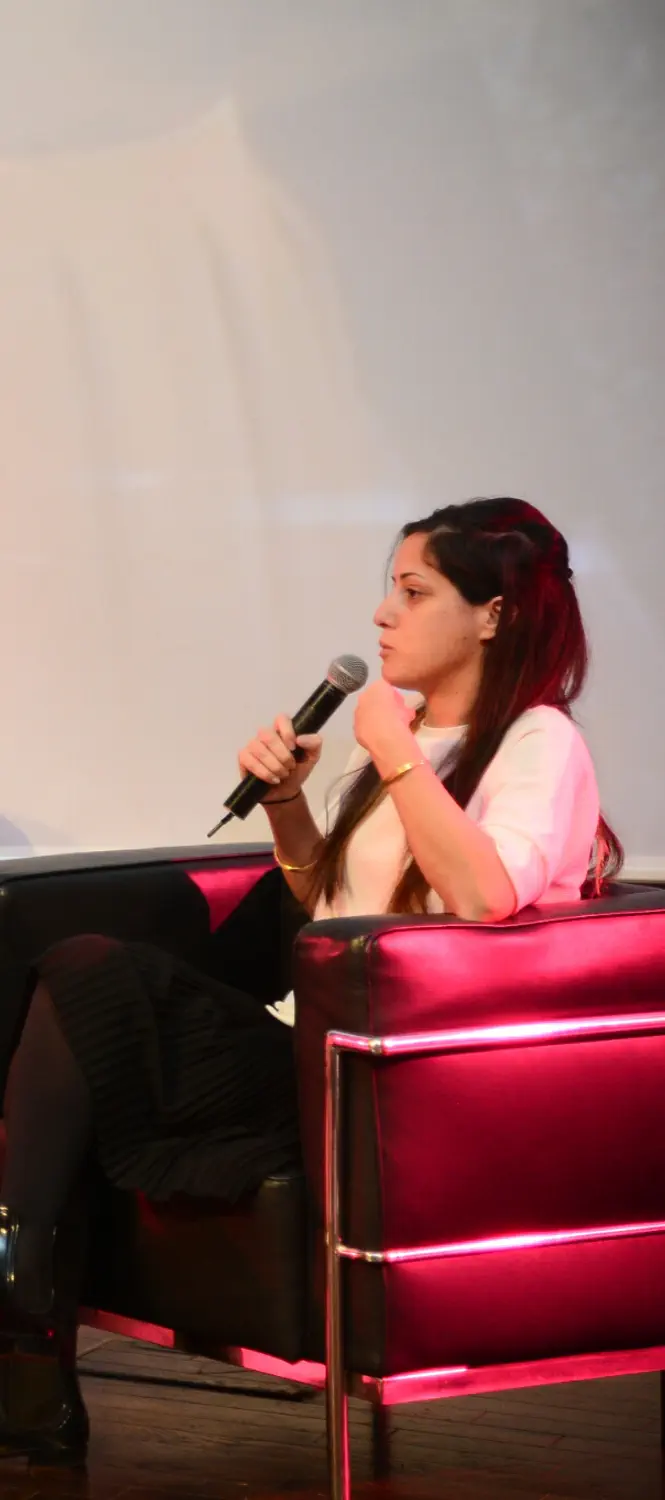
The highlight, however, was the Woman of the Year Award, which went to Tzilit Jacobson, lawyer, vivacious young mother of eight and chairperson of "Bat Melech (meaning Daugher of Kings, a biblical term of praise for the Jewish woman)," the center for religious battered women. "Bat Melech" is not part of Emunah, but as the self-effacing and articulate Tzilit declared: "The honor and appreciation is not for me. Like you, Emunah women, I am just a facilitator. The honor goes to those brave women in the shelters who decide to choose life, to rebuild their lives with superhuman courage, to be the 'daughters of kings.'"
"Queen Esther, too," she continued, "found that she had strengths she never imagined having and every woman has a part of Queen Esther within her. The women in our shelter, standing under the wedding canopy, never imagined the turn their lives would take, but they found the strength to protect their children and themselves from an enemy within the home. Every Esther needs a Mordecai to stand behind her, someone who believes that she can save herself and her children and helps her accomplish that. No woman or child should ever have to live under threats and violence."
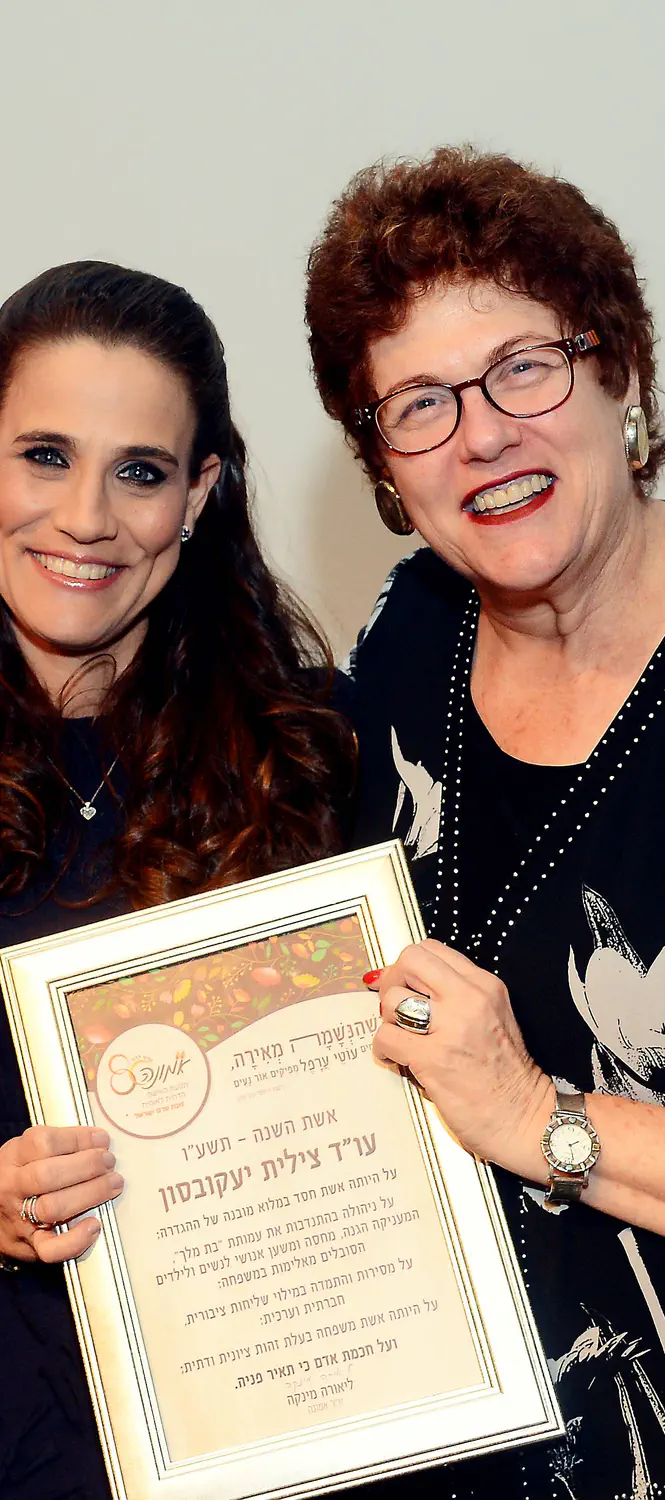
Although the packed program, including a performance by famous Israeli singer Yardena Arazi, left no time to recall the women of valor who built the organization and most of its institutions, it seemed that the words Rabbanit Sarah Herzog (founder of World Emunah and wife of Israel's second Chief Rabbi) wrote in her diary had come true: "A profession, economic independence, broad education - these are the needs of the hour for the woman in Israel, and these in no way conflict with 'kol kvoda bat melech pnima (the traditional modesty of the Jewish woman).' The advancement of the woman in our time - that is the necessity that stems from the fact that the religious woman is involved and vocal."
In fact, Emunah's first chairperson was beloved visionary Tova Sanhedrai, who helped establish the organization that began as Hapoel Hamizrachi Women and later merged with the Omen organization. She headed Emunah for 50 years, also serving as National Religious Party (NRP) MK from 1959-1974. She was followed by the late Sara Stern-Katan, an Israel Prize winner in her own right, who also served as an NRP MK from 1977-1981, then by Judith Huebner who chaired the organization from 1990-1996 and Rochel Sylvetsky, chairperson from 1996-2001.
There was a serious side to the 80th anniversary as well. Things are changing organizationally for Emunah Israel. In the early afternoon, before the festivities began, close to a hundred delegates of Emunah's Administrative Council held a two hour meeting to ratify a new constitution, worked on for two years by a committee of veteran members, including indefatigable former Emunah vice-chairperson Chana Melamed, longtime legal advisor Miriam Rechtman and others. Till now, Emunah was headed by an elected chairperson, vice chairperson and secretariat which met weekly, and traditionally had a national administration consisting of 50 or so elected representatives from all over the country who were involved hands-on, met monthly to discuss the budget, plans, problems – and to authorize or ratify items on its agenda. The organization was based on active women's groups all over the country, each with a volunteer chairperson, salaried secretary-general, members and a roster of programs and volunteer projects. Emunah had political clout and its head or the woman of its choice was expected to go on to the Knesset in the Religious Zionist party.
The Jewish Home party primaries, whose candidates reflected the large number of successful religious Zionist career women who are not members of Emunah, and the law separating government funded organizations from political involvement, changed the political reality, but not the importance of Emunah to the Religious Zionist movement.
And although the branches and volunteers continue to be active, it is more difficult to attract new members, and the new constitution has restructured Emunah's administration in line with the current demands of Israeli law to reflect the education and welfare services of a regular non-profit organization (Amuta in Hebrew), with a board, chairperson of the board and CEO to run it, and a general assembly which will meet quarterly. Instead of the title CEO, it was decided to use the title of President for the salaried position of head of Emunah Israel, as befits the leader of the largest religious women's organization in the world, who represents much more than an ordinary CEO.
The constitution was eventually ratified unanimously, but first an objection sent by veteran member Ivria Levine took the delegates by surprise. It concerned the new constitution's delineation of Emunah's aims as "maintaining a dati and mesorati women's organization." While this may have been meant to fall in line with the Jewish Home party's opening its ranks to traditional as well as Orthodox Jews, a weighty question in itself for Emunah, the word "mesorati," which literally means traditional in Hebrew, is what the Conservative Movement in Israel calls itself. The native born Israeli delegates were not aware of that connotation and after an explanation by Rochel Sylvetsky, Rabbanit Dr. Ayala Glicksberg (whose husband is the rabbi of Givatayim) and Ellen Toby Kaufman, daughter of Emunah America's board member Beverly Segal, the word "mesorati" was voted on and removed, by a large majority. Emunah accepts children from every background in its daycare centers and includes women from all the different levels of halakhic observance, but it is most definitely an organization of Orthodox women – its very description, the National Religious Women's Organization, attests to that - and may its coming eighty years, G-d willing, be as fruitful as the first.
